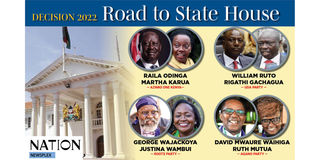Kenya to have shortest president ballot paper

Kenya is set for the lowest number of presidential candidates—four—since the advent of multiparty democracy in 1992 after the electoral commission knocked out more than 50 aspirants from the race.
The Independent Electoral and Boundaries Commission (IEBC) yesterday June 6 ended the final stage of clearance of presidential aspirants for the August 9 elections. Only four hopefuls passed the test out of 18 aspirants shortlisted, down from the 54 who had expressed interest in the State House job.
The four who were cleared by the Wafula Chebukati-led IEBC are Deputy President William Ruto, Azimio la Umoja One Kenya Coalition party candidate Raila Odinga, Roots Party leader George Wajackoyah and Agano Party's David Mwaure Waihiga.
In the 2017 elections, Kenya had eight candidates, the same number that were on the ballot in 2013. In 1997, the number almost doubled to 15, up from eight in 1992 when Kenya held its first multiparty democracy elections.
There were five candidates in 2002, before the number climbed to nine in 2007.
Drama
Yesterday, there was drama as Safina Party presidential candidate Jimi Wanjigi protested his dismissal for lack of a university degree while Ford Asili party leader Njeru Kathangu skipped the exercise, saying he is not ready to go to “a slaughterhouse”.
Umoja Summit Party leader Walter Mong’are alias Nyambane, who had been cleared by the electoral agency last week, had his nomination certificate revoked for lack of a university degree.
“We have cleared only four candidates to run for president and they are David Mwaure, George Wajackoyah, Raila Odinga and William Ruto,” announced Mr Chebukati.
Revocation
He said the revocation of Mr Mongare's nomination certificate came after the commission was seized of new information about his academic qualifications.
“Upon discovery of new information of lack of university degree on the part of Walter Mong’are, we summoned him to appear before us but he did not honour our summon,” he said.
The day also saw attempts by Mr Wanjigi to join the list hit a dead-end after his application for clearance to contest in the August 9 polls was rejected by IEBC.
Mr Chebukati said the rejection was due to Mr Wanjigi lacking a university degree contrary to section 2(2) of the Elections Act. Mr Chebukati maintained that Mr Wanjigi could only be cleared if he presented a physical copy of his degree certificate.
“You don’t have a degree certificate. You have just attached transcripts and you will be graduating sometime in December,” Mr Chebukati told Mr Wanjigi.
“Due to that, I am rejecting your application to be nominated as a candidate ... That’s my decision as the returning officer for presidential election,” he added.
Further, Mr Wanjigi's application failed to meet the threshold of supporters’ signatures from 24 counties, missing the mark by a single county, as well as inconsistencies in copies of IDs submitted.
Contesting the verdict, Mr Wanjigi claimed there is a very clear scheme to ensure certain aspirants do not get to the ballot, vowing to be on the ballot come what may.
“There is a mchujo (elimination)being done somewhere. You cannot apply different rules for different people. We were told that all the documentation was alright during our pre-nomination meeting," said Mr Wanjigi.
“You will not get away with this. There are certain people who don’t want some individuals on the ballot. I fear for the coming elections. But I want to assure my supporters that I will be on the ballot on August 9 come what may,” he added.
Next in line was independent aspirant Muthiora Eliud Kiriara who was also dismissed for failing to get the requisite number of supporters’ signatures from at least 24 counties.
Mr Chebukati said Mr Kiriara also provided only one bundle of copies of IDs against a requirement of 24 bundles. Furthermore, the bundle did not match with the list of supporters.
“We have looked at your documents and you have insufficient supporters. You submitted 20 counties and after analysis only 19 passed the test. For those reasons, we reject your application for nomination as a presidential candidate,” said Mr Chebukati.
Burning voter’s card
Even after being given a second chance, Mr Kiriara still fell short and resorted to burning his voter’s card in protest.
When it came to Ford Asili presidential aspirant Njeru Kathangu’s turn, he skipped the exercise together with his running mate Michael Arunga.
His representative, Isaac Oneka, the national chairman of Ford Asili, said the clearance process is meant to publicly humiliate and kill the political potential and ambitions of aspirants.
“The current IEBC nomination process is a real slaughter for politicians. We refuse to present ourselves to the slaughter house,” Mr Oneka said.





